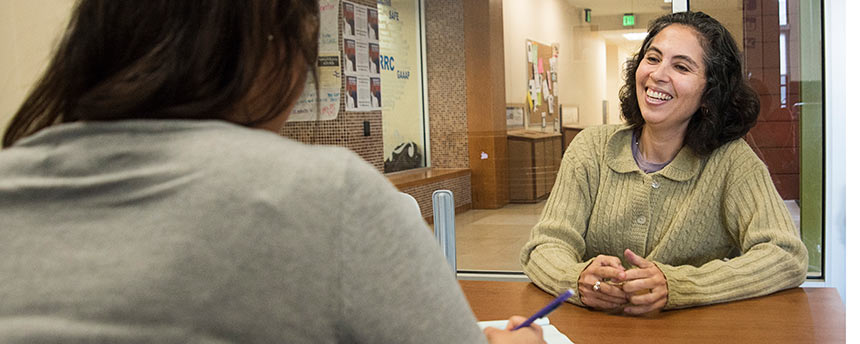New UC Davis graduates: Thinking about a job at your alma mater? I have five suggestions to help you succeed.
1. Assess yourself on career directions

If you don’t know what you want to do, start with a career self-assessment. Two websites with free, straightforward options are: California Career Zone and CareerOneStop.
2. Research online about potential jobs

If you aren’t going on to graduate school, generally you have two lenses to look through: The advantages of working at UC Davis and those of working outside of the university. In my last blog post, I gave advice about doing research on where you want to work, focused on companies and employers in the private sector.
In this post, we’ll look at how to find a job at the university. Similar to the private-sector search, you need to begin with research on the UC Davis website, whether it is for the Davis campus administration or in colleges, schools and other academic units. Don’t forget to check out opportunities in Sacramento at the UC Davis Health campus.
Find a UC Davis department that interests you and research its website — what unique things are happening there? What work is the department responsible for? Who are the leaders? Does that department have any open positions on the careers portal?
3. Reach out for informational interviews

Study the department website and think about the best people to contact for informational interviews. Seek someone in a similar position to the job opportunity you would like and not the supervisor for the position itself. See if the department has an online organizational chart and look up the people you find in LinkedIn, Twitter and on blogs. Send them LinkedIn connection requests.
If you have a common friend or colleague, ask for a referral to people you’ve found in the department. Even if you don’t have that connection, call and ask for 10 minutes of their time to learn more about their job, role and the department.
During the interview, show your interest, asking why they enjoy their job and working at UC Davis. Make this time work for you: Find out if working in that department is what you really want to do.
4. Apply for positions that match your background and experience

Check the Davis campus employment website and/or the Sacramento campus employment website at least once a week. Jobs are posted usually for two weeks at a time, so check weekly, and try different keywords to find possibilities that suit your background and experience.
UC Davis does hire new graduates — the titles for entry-level positions vary so be sure to search the careers page and try different job titles such as analyst, coordinator, researcher or assistant. If the position is more senior in nature, and you do not have the requisite experience or skills, do not apply.
Find out who the position reports to — and what that supervisor does. Do they have a number of positions that they manage? This might tell you if opportunities for growth in the position and the department exist.
Is this job a career builder? That is, can you create more value for yourself by learning new skills within this first job — and is there a chance to get an advanced, better paying job in the future?
Today, people are staying in jobs two to three years before receiving promotions or transferring. Ask yourself, will this position challenge you and keep you interested during that time?
5. Make your resume stand out

Now that you have zeroed in on a position, you should be asking, “What do I need to do to make my application and resume stand out?”
UC Davis and most employers look for relevant experience in the work history part of the application —and a bang-up resume will stand out to them. For this task, you must carefully read the job description, duties and minimum qualifications, and make the connection to your own skills and background. The first thing that recruiters and hiring managers look at is relevant experience in the top of the resume and application that connects to those three areas.
Consider taking an inventory of your transferable skills that helps you look at your past experiences and accomplishments and how they can translate into job-ready abilities and strengths. Think about your volunteer work, internships, unpaid positions and leadership experience.
One mistake new graduates often make is listing their education first with a summary of coursework and GPA.
When you organize your resume, lead with a bang to make it stand out. Create a top section called “Professional Summary,” “Summary of Qualifications” or “Career Highlights.” In this section, put the skills and experience in bulleted sentences or in a narrative paragraph that relates to the position you are applying for.
Here is an example:
Summary of Qualifications
- Excellent time management and planning skills to ensure deadlines will be met
- Great group and interpersonal communication skills, both written and verbal
- Resourceful, dedicated and highly motivated with good critical-thinking skills
- Ability to work well under pressure and effectively manage stressful situations
- Physically fit, able to perform strenuous field work and loves being outdoors
- Highly organized, responsible and disciplined with a positive attitude
- Proficient in Microsoft Office (Word, PowerPoint, Excel) and internet resources
Similar to the example above, in your following work history use power words to lead off sentences.
Put your education at the bottom and leave out your GPA. If you received academic honors, include that information under your education.
In summary, as you navigate the path to your first career position, make sure you represent yourself strongly, and that you do in-depth research so you can choose the right job for you.
And get connected to people! They will help you get that job by giving insight into the organization, the job and the expectations.
Bruce Mattos is a talent acquisition manager for UC Davis Human Resources, recruiting for executive positions on the Davis campus. Throughout his career, Bruce has been a professional talent hunter, sourcing strategist and recruitment leader.